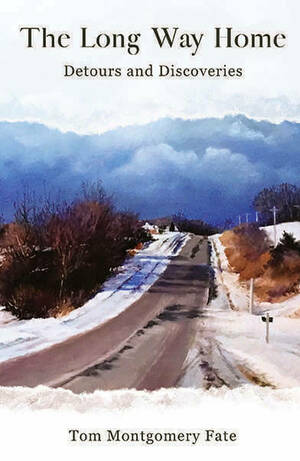This year as we celebrate the 100th birthday of Jack Kerouac, author of On the Road, we might also anticipate the release of The Long Way Home (Ice Cube Press), the latest offering by Notre Dame Magazine contributor Tom Fate, for its banquet of pleasing parallels to Kerouac’s masterpiece.
On the Road, published September 5, 1957, and considered by some critics as America’s greatest novel, chronicles the chaotic journeying of Kerouac, thinly disguised as young writer Sal Paradise, as he travels back and forth across the country, in search of adventure and purpose. Though categorized as fiction, the novel is based on time Kerouac spent in New York, Denver, New Orleans, Mexico City and San Francisco, as the contemplative narrator grows from exasperation and uncertainty about the world, to a sense of confidence and happiness about his role in life, as a result of his experiences and friendships with other young artists.
Fate, who lives in Glen Ellyn, Illinois, and is a former writing professor at College of DuPage, writes about his own travels to Nicaragua, Canada, the Philippines, South Dakota, Minnesota, Iowa and elsewhere around the globe, in a similar search for meaning, while using the real names of colorful characters he encounters in a work of nonfiction.

Full disclosure: Fate has been a teaching colleague and friend, but also a rival freelance commentary writer for the Chicago Tribune, other Midwest newspapers and for this magazine. Although I am not certain about the exact tally of our competing essays over the past two decades, I admire his talent and have marveled at his four previous books. This is a commentary, therefore, and not a book review, which I write with the desire and expectation that Fate’s latest will win the National Book Award, catapulting his career to such heights that he’ll finally relinquish the periodical venues to me!
A fair-to-middling bass and trout angler, and a graduate of the Chicago Theological Seminary and of the University of Iowa Nonfiction Writing Program, Tom Fate is, at his core, a storyteller.
The first chapter in The Long Way Home is an alluring trap rendering us captive through the rest of this provocative memoir. We’re hooked when Fate writes that he both loved and hated being a preacher’s son, ushering us to the climactic moment when he makes up his mind that he will not get confirmed. He’s 14 years old and he is about to tell his father, the minister at the Congregational Church, that he no longer believes.
So as not to spoil the ending of chapter one whose title is “Fishing For My Father,” suffice to say that it is one of over a dozen stories in this slim volume that took me luxuriously long to read. The stories go fast because they’re compelling and relatable, but page by page you slow down as to pause and gaze into the distance, scanning your own memory to recall how you felt and what you thought at comparable junctures in your own life.
It’s time well spent, as Fate poses questions identical to those of Kerouac: Why are we here? What is love? How do we respond to loss? Share the earth? Respond to suffering?
Fate calls his process of traveling and writing a form of “fishing.” He mesmerizes us with a colorful evocation of a trip, for example, to the Pine Ridge Reservation, where he’s almost immediately robbed at gunpoint, but later invited to a sweat lodge. Or his trip to Nicaragua during the Sandinista revolution, armed with a press pass from The Daily Iowan, accompanied by Carol, the woman he fell in love with months earlier, and whom he would marry in the middle of a war zone in Managua.
His prose, better than Panavision, makes us forget Netflix, Facebook and even food while immersed in another of his tales. And throughout each story, he tells us what he thinks or is puzzling over, “fishing” to learn what he felt, what he feared, where he failed or what he did not know.
In a “A Map to Somewhere” (chapter 11), Fate relates the sometimes harrowing, sometimes hilarious adventure of a fishing and canoe camping trip in Canada with his three brothers, Robin, Paul and Kendall, when they had to resort to Plan B after most of Quetico Provincial Park was closed because of raging wildfires. Smoke, inclement weather, unreadable maps, dead cell phones and salty arguments ranging from fishing strategies to the correct return route all impede their return to civilization. But amid all the perils and yet unsure of where exactly they are, Fate returns to a sense of home around the campfire each night, when they reminisce about past trips and share stories about their late father:
“It was the balm of memory that always knit our frayed egos and tired bodies back together again, so we were once more at home with each other. No matter what happened on those trips, or in our lives, that was where we always ended up."
For Kerouac, the search was for “it,” or what he wanted out of life. For Fate, it is finding the way home.
All the experiences comprise a journey with a tangle of detours, a very long way to home, which, literally, is where he grew up in Iowa, although figuratively, it can be anywhere he feels a sense of belonging, understanding and relevance. It is where, even if he hasn’t found the answers to all his questions, he’s found where he fits in the universe and its scheme, and it usually entails some sort of harmony with family, the earth, time, God and society, though not necessarily in that order.
The best thing about Fate’s writing is that you don’t have to read or contend with the paragraph I’ve just written. Just sink into the stories, and Fate’s wonder and insights will sink into you.
David McGrath, English professor emeritus at the College is DuPage, is the author of SOUTH SIDERS. mcgrathd@dupage.edu